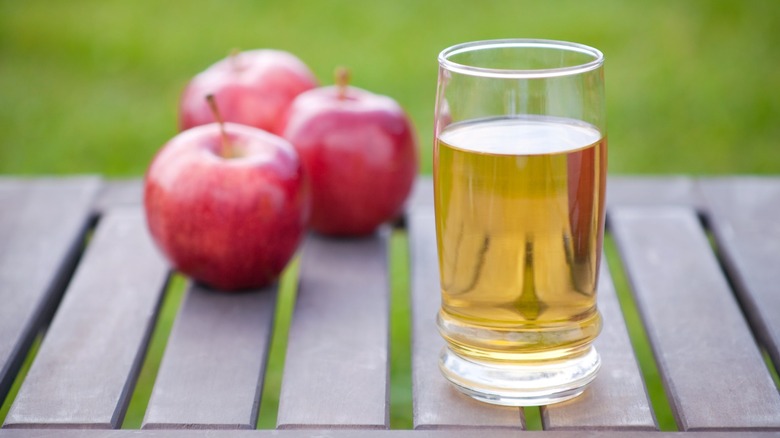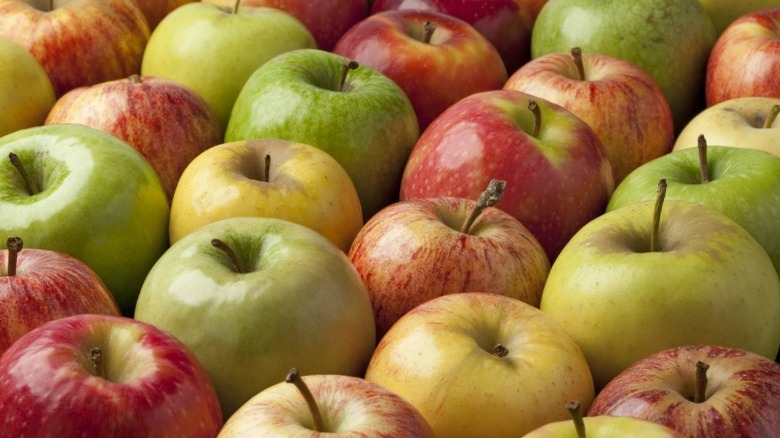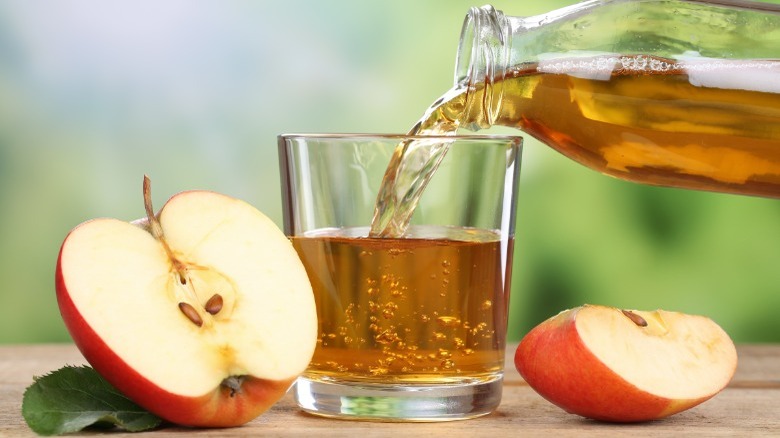Why Apples Are The Base Of Most Juices
When you're purchasing juice at the store, whether it be cranberry, tropical citrus, or pomegranate, you might assume that the produce pictured on the label represents most of the ingredients in the bottle. Think again: If you read the fine print, you would discover that many popular fruit drinks use one type of juice as a base.
Apple juice makes up a good chunk of the juice bottles and jugs you find at the supermarket. In an X (formerly known as Twitter) thread from March 2024, user @echetus shows examples of what they call the "applejuiceification" of beverages. They photographed the ingredient lists of 13 non-apple drinks — like the popular Naked-brand fruit smoothies — and the majority of them were comprised of at least 50% apple juice.
While this may be a shock to some, others might not see an issue. Apple juice is unexpectedly hydrating and beloved by kids and adults alike. For manufacturers, apples are the perfect foundation for fruity refreshments because of their sweetness, relatively neutral flavor, and affordability. Apple juice can increase the sugar content of products without significantly altering the flavor, so drinks can taste like berries, guava, peach, or pineapple, but still consist mostly of apple. However, some consumers find this practice disingenuous and even unhealthy.
Why do so many juices consist mainly of apples?
Apple juice is a win-win for manufacturers because it's far cheaper than most other fruit juices, and is filled with the sugariness needed to create the sweet taste many consumers expect. Companies can even brag that products sweetened with apple juice contain "no added sugars," because the sugars in the juice are naturally-occurring.
Apples also come in tons of varieties, each with their own balance of sweetness to tartness, which allows producers to customize the taste of their drinks. When adding apple to the mix, brands made strategic selections based on the fruit's flavor profile. For example, using a Granny Smith would dial up the tartness of a drink, but not so much the sweetness, and the opposite would be true with the addition of a Fuji apple.
Sometimes juice formulations need to reach a certain pH for flavor, and apples can be used to hit the right spot. Different apples have different pH values, which indicate how acidic or basic something is. A pH of zero is the most acidic, while 14 is the most basic. A Delicious apple has a pH of around 3.9, and a McIntosh apple's pH is 3.34. Even differences as small as this can make an impact. An acidic apple can be added to fruits that are more basic and the juice will have a lower pH and more acidity, without the manufacturer having to add another acid, which could result in a too-tart drink.
Are apple juice blends unhealthy for you?
Although the use of apple juice has benefits for manufacturers, it has caused controversy with customers more than once. In 2016, PepsiCo, the creator of Naked juices, was sued for misleading marketing practices. Ingredients are listed on food labels in the order of their weight, and the lawsuit asserted that in 16 products — from "Green Machine" juice with kale to blends with blueberries, mangos, and more – apple or orange juice was the first ingredient listed, instead of the advertised veggies or trendy super fruits.
The case also gripes with Naked's assertion that it doesn't add any sugar to its drinks. While a shopper may believe they're choosing a low-sugar option, each bottle has anywhere from 34 to 61 grams of sugar. Fruit juice concentrates like apple have higher levels of fructose, a form of sugar, than high fructose corn syrup, as well as lower amounts of nutrients and higher amounts of sugar than whole fruits. This isn't even to mention that it can be disappointing to buy a drink that tastes mostly of apples, rather than the fruits you were hoping for.
Consumers continue to post about their juice-sleuthing efforts on social media. One user on Instagram posted a video exposing the apple content in various products, and popular drinks like Ocean Spray's cran-raspberry did not dodge the "applejuiceification" epidemic. If you're not down with this practice, it's time to start scanning those nutrition facts much more closely.



